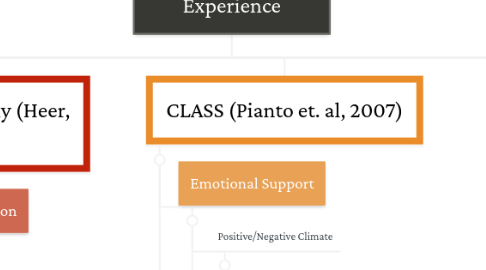
1. Vygotsky (McCleod, 2014).
1.1. Through Social Interactions
1.1.1. More Knowledgeable Other
1.1.1.1. Betsky, as the MKO, is teaching Rudi how to learn.
1.2. Proximal Zone of Development
1.2.1. Betsy tries to use cards that Rudi can read, using his family members' names, so that he can eventually read the words on his own.
1.2.2. She tries to employ scaffolding in these ways.
2. Culturally responsive teaching (Gay, 2010)
2.1. Multidimensional
2.1.1. It is difficult for Betsy to have a multidimensional approach when she does not know much about Iran or Persian culture.
2.1.1.1. She states how the only Persian word she knows is from a recipe.
2.1.2. Comprehensive
2.1.2.1. Rudi is receiving an individualized education to a certain extent through his ESL class.
2.2. Empowering
2.2.1. Betsy has a difficult time knowing how to respect the strict discipline that Rudi's brother says is cultural but also believing that it may be unhealthy for Rudi.
2.2.2. Rudi still does not feel empowered to be an individual, especially in light of the fact that his own teacher is quite frustrated with him.
3. Bronfenbrenner (Paquette, & Ryan, 2001)
3.1. Microsystem
3.1.1. Family
3.1.1.1. He and his family moved from a different country.
3.1.1.2. His parents are still in Iran.
3.1.1.3. His older brother is looking after him, but his brother is busy studying at school himself.
3.1.2. Neighborhood
3.1.2.1. He is living in a neighborhood he is unfamiliar with.
3.1.3. School
3.1.3.1. Rudi has moved to multiple schools in the span of a couple months.
3.1.3.2. The rough transition may have contributed to his angry and hostile behavior.
3.1.3.3. Rudi is having a difficult time making friends, and other people's attempts to befriend him were perceived as threatening.
3.2. Mesosytem
3.2.1. Parents -Teacher Relationship
3.2.1.1. Besty seeks to understand Rudi's circumstances more, and even after hearing from his aunt about his family situation, she acknowledges that she does not know the full story.
3.2.1.2. The parents are unable to make it, and instead, his aunt shows up.
3.2.1.3. Betsy is able to understand Rudi's circumstances and behavior better, and she has a softened heart towards him.
3.2.1.4. Betsy is more determined to engage in a plan of action to help Rudi academically.
3.2.1.5. Betsy tries to set up a parent-teacher conference.
3.2.2. Parent- Principal Relationship
3.2.2.1. The brother brings Rudi to the school, so that principal is not even aware if Rudi has a father or mother.
3.3. Exosystem
3.3.1. Cultural values
3.3.1.1. His family comes from a more traditional., Iranian background that may not conform to American norms.
3.3.1.2. Rudi has to deal with conflicting "Western" and "Eastern" ideals.
3.3.2. Society
3.3.2.1. There is an influx of newcomers coming into the city.
4. Bloom’s taxonomy (Heer, 2012).
4.1. Knowledge Dimension
4.1.1. factual
4.1.1.1. Rudi is mostly learning factual knowledge at this point.
4.1.1.1.1. He is learning how to write different words.
4.2. Cognitive Process Dimension
4.2.1. lower order thinking skills
4.2.1.1. Rudi practices lower order thinking skills like remembering and understanding key words with Betsy.
4.2.2. higher order thinking skills
4.2.2.1. She has not proceeded to help him learn more higher order thinking skills yet.
5. CLASS (Pianto et. al, 2007)
5.1. Emotional Support
5.1.1. Positive/Negative Climate
5.1.1.1. Betsy attempts to create a positive climate by encouraging her students to be welcoming to Rudi.
5.1.1.1.1. However, she does not know how to perceive once Rudi becomes violent towards his classmates.
5.1.1.2. Rudi may feel like he is a negative climate when his teacher yells at him for his actions.
5.1.1.2.1. He may think that his small action of scribbling in the library book did not warrant his teacher's frustrated response.
5.1.2. Teacher sensitivity
5.1.2.1. She tries to be sensitive to Rudi, especially after she hears about his family situation, but it is still difficult.
5.2. Instructional Support
5.2.1. Quality of feedback
5.2.1.1. Betsy offers more individualized attention.
5.2.1.2. Rudi reads cards back to Betsy.
5.2.1.3. Betsy uses feedback loops to solidify concepts with organic reading.
5.2.2. Language modeling
5.2.3. Concept Development
5.2.3.1. Betsy tries to use the names of Rudi's family so that he can associate things that he is familiar with to new concepts.
6. Implicit Bias
6.1. Rudi as a Iranian immigrant
6.1.1. Because he is a minority within her school, Betsy may be more inclined to interpret his misbehavior as something that deserves greater punishment than it does.
6.2. Rudi as an ESL learner
6.2.1. He mostly speaks Persian.
6.2.2. The school and the teachers within the school may interpret his academic struggles as something that cannot change rather than something due to his lack of English skills.
6.2.3. Betsy may unintentionally not be assigning him as rigorous work because of her implicit bias that he is not able to learn as much.
6.2.3.1. She may have low expectations, and that may translate in her individualized teaching with him.
7. Classroom organization
7.1. Behavior Management
7.1.1. Rudi is constantly being referred for behavioral issues.
7.1.2. Rudi is still being very aggressive in the classroom.
7.1.3. Betsy is silent about how to deal with Rudi's fights with his fellow students.
7.2. Productivity
7.3. Instructional Learning formats
7.3.1. Betsy engages in extra 15 minute , one-on-one sessions with Rudi.
7.3.1.1. In addition, his brother adheres to many traditional ways and hits his brother a bit too much, according to his aunt.
